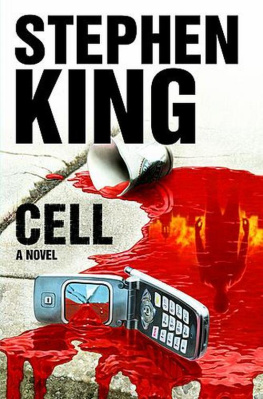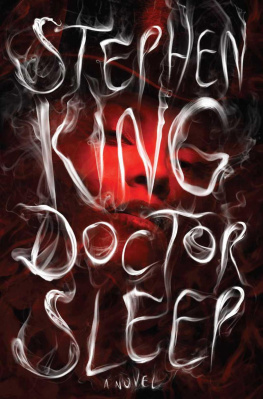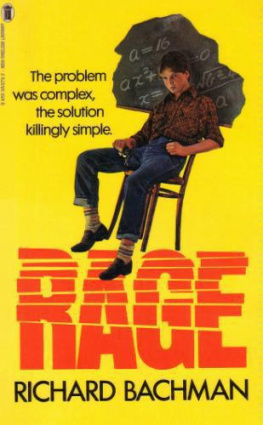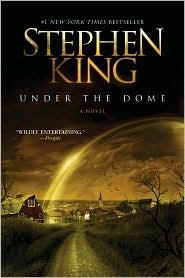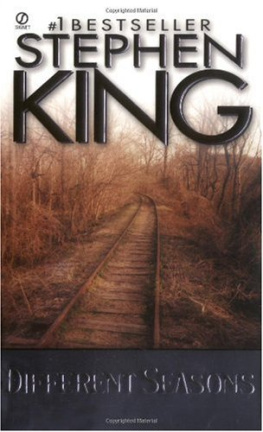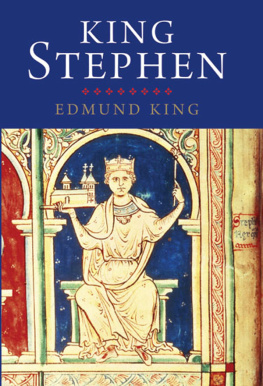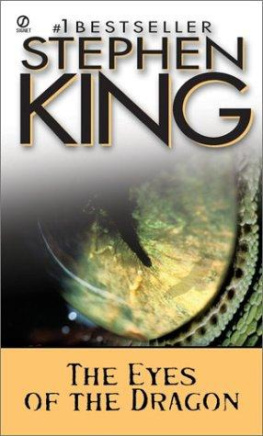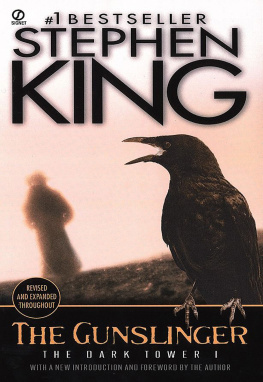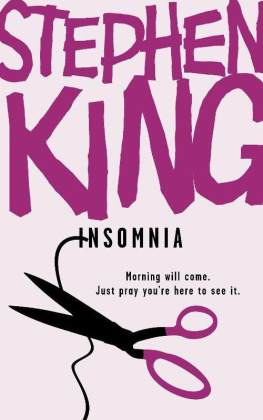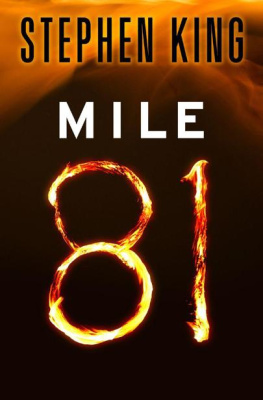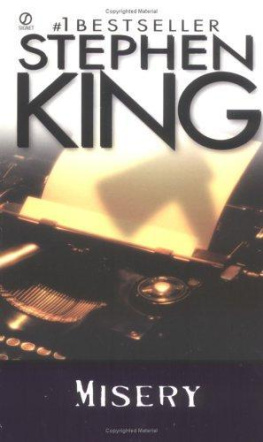Stephen King - Cell
Here you can read online Stephen King - Cell full text of the book (entire story) in english for free. Download pdf and epub, get meaning, cover and reviews about this ebook. year: 2006, publisher: Simon & Schuster Adult Publishing Group, genre: Detective and thriller. Description of the work, (preface) as well as reviews are available. Best literature library LitArk.com created for fans of good reading and offers a wide selection of genres:
Romance novel
Science fiction
Adventure
Detective
Science
History
Home and family
Prose
Art
Politics
Computer
Non-fiction
Religion
Business
Children
Humor
Choose a favorite category and find really read worthwhile books. Enjoy immersion in the world of imagination, feel the emotions of the characters or learn something new for yourself, make an fascinating discovery.
- Book:Cell
- Author:
- Publisher:Simon & Schuster Adult Publishing Group
- Genre:
- Year:2006
- Rating:4 / 5
- Favourites:Add to favourites
- Your mark:
- 80
- 1
- 2
- 3
- 4
- 5
Cell: summary, description and annotation
We offer to read an annotation, description, summary or preface (depends on what the author of the book "Cell" wrote himself). If you haven't found the necessary information about the book — write in the comments, we will try to find it.
Cell — read online for free the complete book (whole text) full work
Below is the text of the book, divided by pages. System saving the place of the last page read, allows you to conveniently read the book "Cell" online for free, without having to search again every time where you left off. Put a bookmark, and you can go to the page where you finished reading at any time.
Font size:
Interval:
Bookmark:
STEPHEN
KING
CELL
A NOVEL
SCRIBNER
New York London Toronto Sydney
For Richard Matheson and George Romero
SCRIBNER
1230 Avenue of the Americas New York, NY 10020
This book is a work of fiction. Names, characters, places, and incidents either are products of the author's imagination or are used fictitiously.
Any resemblance to actual events or locales or persons, living or dead, is entirely coincidental.
Copyright 2006 by Stephen King All rights reserved, including the right of reproduction in whole or in part in any form.
SCRIBNER and design are trademarks of Macmillan Library Reference USA, Inc., used under license by Simon & Schuster, the publisher of this work.
DESIGNED BY ERICH HOBBING Text set in Garamond No. 3
For information about special discounts for bulk purchases,
please contact Simon & Schuster Special Sales at 1-800-456-6798 or business@simonandschuster.com Manufactured in the United States of America
13579 10 8642 Library of Congress Cataloging-in-Publication Data is available.
ISBN-13: 978-0-7432-9233-7 ISBN-10: 0-7432-9233-2
The id will not stand for a delay in gratification. It always feels the tension of the unfulfilled urge.
SIGMUND FREUD
Human aggression is instinctual. Humans have not evolved any ritualized aggression-inhibiting mechanisms to ensure the survival of the species. For this reason man is considered a very dangerous animal.
KONRAD LORENZ
Can you hear me now?
VERIZON
CELL
Civilization slipped into its second dark age on an unsurprising track of blood, but with a speed that couldnot have been foreseen by even the most pessimistic futurist. It was as if it had been waiting to go. On October1, God was in His heaven, the stock market stood at 10,140, and most of the planes were on time (except forthose landing and taking off in Chicago, and that was to be expected). Two weeks later the skies belonged tothe birds again and the stock market was a memory. By Halloween, every major city from New York toMoscow stank to the empty heavens and the world as it had been was a memory.
The Pulse
The event that came to be known as The Pulse began at 3:03 p.m., eastern standard time, on the afternoon of October 1. The term was a misnomer, of course, but within ten hours of the event, most of the scientists capable of pointing this out were either dead or insane. The name hardly mattered, in any case. What mattered was the effect.
At three o'clock on that day, a young man of no particular importance to history came walkingalmost bouncingeast along Boylston Street in Boston. His name was Clayton Riddell.
There was an expression of undoubted contentment on his face to go along with the spring in his step. From his left hand there swung the handles of an artist's portfolio, the kind that closes and latches to make a traveling case. Twined around the fingers of his right hand was the drawstring of a brown plastic shopping bag with the words small treasures printed on it for anyone who cared to read them.
Inside the bag, swinging back and forth, was a small round object. A present, you might have guessed, and you would have been right. You might further have guessed that this Clayton Riddell was a young man seeking to commemorate some small (or perhaps even not so small) victory with a small treasure, and you would have been right again. The item inside the bag was a rather expensive glass paperweight with a gray haze of dandelion fluff caught in its center. He had bought it on his walk back from the Copley Square Hotel to the much humbler Atlantic Avenue Inn where he was staying, frightened by the ninety-dollar pricetag on the paperweight's base, somehow even more frightened by the realization that he could now afford such a thing.
Handing his credit card over to the clerk had taken almost physical courage. He doubted if he could have done it if the paperweight had been for himself; he would have muttered something about having changed his mind and scuttled out of the shop. But it was for Sharon. Sharon liked such things, and she still liked him I'm pulling for you, baby, she'd said the day before he left for Boston. Considering the shit they'd put each other through over the last year, that had touched him.
Now he wanted to touch her, if that was still possible. The paperweight was a small thing (a smalltreasure), but he was sure she'd love that delicate gray haze deep down in the middle of the glass, like a pocket fog.
Clay's attention was attracted by the tinkle of an ice cream truck. It was parked across from the Four Seasons Hotel (which was even grander than the Copley Square) and next to the Boston Common, which ran along Boylston for two or three blocks on this side of the street. The words MISTER SOFTEE were printed in rainbow colors over a pair of dancing ice cream cones. Three kids were clustered around the window, bookbags at their feet, waiting to receive goodies. Behind them stood a woman in a pants suit with a poodle on a leash and a couple of teenage girls in lowrider jeans with iPods and earphones that were currently slung around their necks so they could murmur togetherearnestly, no giggles.
Clay stood behind them, turning what had been a little group into a short line. He had bought his estranged wife a present; he would stop at Comix Supreme on the way home and buy his son the new issue of Spider-Man; he might as well treat himself, as well. He was bursting to tell Sharon his news, but she'd be out of reach until she got home, three forty-five or so. He thought he would hang around the Inn at least until he talked to her, mostly pacing the confines of his small room and looking at his latched-up portfolio. In the meantime, Mister Softee made an acceptable diversion.
The guy in the truck served the three kids at the window, two Dilly Bars and a monster chocolate-and-vanilla swirl sof-serve cone for the big spender in the middle, who was apparently paying for all of them. While he fumbled a rat's nest of dollar bills from the pocket of his fashionably baggy jeans, the woman with the poodle and the power suit dipped into her shoulder bag, came out with her cell phonewomen in power suits would no more leave home without their cell phones than without their AmEx cardsand flipped it open. Behind them, in the park, a dog barked and someone shouted. It did not sound to Clay like a happy shout, but when he looked over his shoulder all he could see were a few strollers, a dog trotting with a Frisbee in its mouth (weren't they supposed to be on leashes in there, he wondered), acres of sunny green and inviting shade. It looked like a good place for a man who had just sold his first graphic novel and its sequel, both for an amazing amount of moneyto sit and eat a chocolate ice cream cone.
When he looked back, the three kids in the baggies were gone and the woman in the power suit was ordering a sundae. One of the two girls behind her had a peppermint-colored phone clipped to her hip, and the woman in the power suit had hers screwed into her ear. Clay thought, as he almost always did on one level of his mind or another when he saw a variation of this behavior, that he was watching an act which would once have been considered almost insufferably rudeyes, even while engaging in a small bit of commerce with a total strangerbecoming a part of accepted everyday behavior.
Put it in Dark Wanderer, sweetheart, Sharon said. The version of her he kept in his mind spoke often and was bound to have her say. This was true of the real-world Sharon as well, separation or no separation. Although not on his cell phone. Clay didn't own one.
Next pageFont size:
Interval:
Bookmark:
Similar books «Cell»
Look at similar books to Cell. We have selected literature similar in name and meaning in the hope of providing readers with more options to find new, interesting, not yet read works.
Discussion, reviews of the book Cell and just readers' own opinions. Leave your comments, write what you think about the work, its meaning or the main characters. Specify what exactly you liked and what you didn't like, and why you think so.

